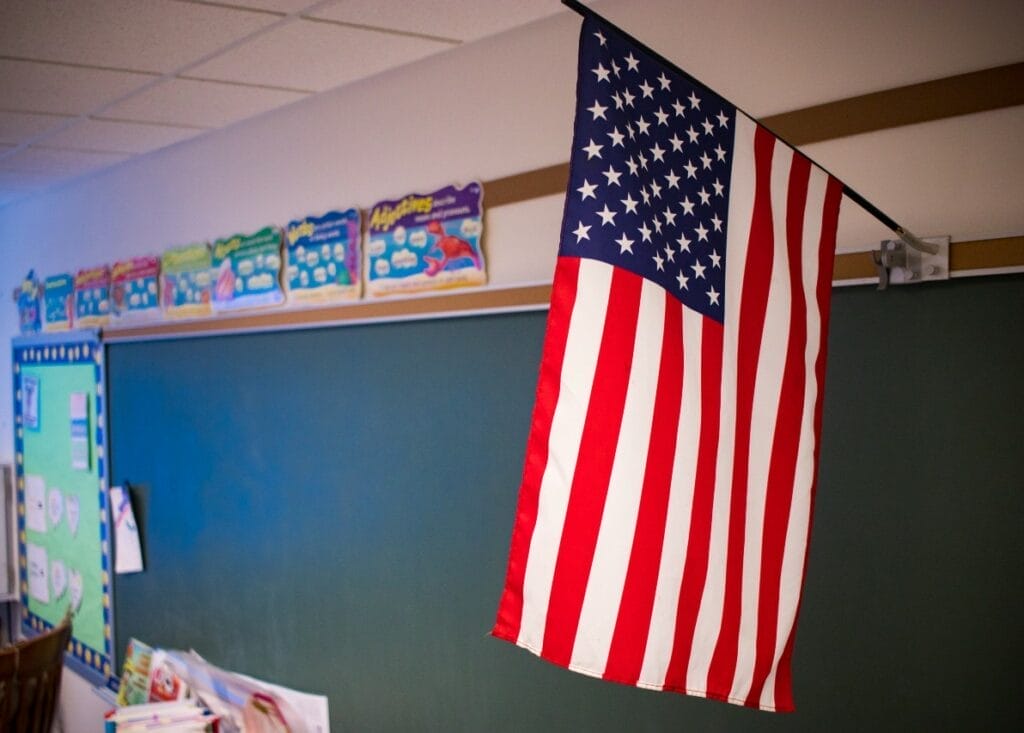A Green Bay school welcomes immigrants, thanks to bedrock principles underlying our American constitution

Jaime Aguilar Morales is an eighth-grader at a Green Bay school that he likes very much, thanks to his own initiative and America’s founding fathers.
Through fifth grade, he attended a public school. “But then I was like, ‘Hmm, why don’t I go to a private school and learn more about God?’” he said.
His mother, who grew up in Mexico and whom he describes as “very Catholic,” taught him the basics. But, he said, he learned those prayers in Spanish, the language of his home and not of the country he was growing up in. “So,” he reasoned, “like, if I go here, maybe they’ll teach me how to do it in English and maybe I’ll learn more about God and Jesus.”
He prevailed on his mother to send him to his neighborhood’s other school, St. Thomas More Catholic School. He flourished: He loves math, he’s on the student leadership team, he lectors at school masses, and he’s learned a bedrock principle of America: Here you are free to practice the faith you choose.
What made it possible for Jaime’s family and for 90% of St. Thomas’ students is Wisconsin’s parental choice program, which lets some families direct their children’s state education aid to a school they choose.
Jaime’s mother directed it to St. Thomas, part of the nine-school GRACE, or Green Bay Catholic Education, system. That system offers a variety of approaches — a classical-education school, for example, another with an international baccalaureate track. St. Thomas focuses on welcoming Spanish-speaking immigrant families.
The school goes to great lengths to ensure that it offers a continuation of what students live at home, rather than a world alien to it. Staff are bilingual, and the school is phasing in formally bilingual classes. Principal Jamie Froh Tyrrell shows off the Dia de los Muertos ofrenda in the cafeteria, where students marked All Souls’ Day by remembering departed relatives and enjoying the customary sweet bread. “We’re not just learning about Hispanic culture but we’re celebrating it,” she said.
That includes the religion central to Hispanic culture. Wisconsin’s school choice makes this possible: “Parents that choose this environment, that’s what they’re looking for,” said Tyrrell. They want their fourth- and fifth-graders learning music by practicing hymns in Spanish accompanied by a classmate on accordion. They want students like Jaime to learn public speaking by reading aloud at mass.
While school choice has grown steadily for three decades in Wisconsin, now serving 50,000 students, secularists long have sniped that if parents want education that doesn’t exclude religion, they can pay for it with their own money.
But these parents do. Alejandra Beals, herself an immigrant from Mexico, now as St. Thomas’ home-school liaison helps families navigate the bureaucracy of school choice. She says it’s a revelation to immigrants when they realize they have options in schooling — and where the money comes from.
“We all pay taxes, but we never know where that money is going to,” she said. She lets parents know that in Wisconsin, they can have a say. Immigrants want a better education, “somebody has to pay for it, and it’s us with our hard work. It’s our taxes working towards education.”
It’s another lesson in how government should be accountable to taxpayers. “It’s going where I am choosing that money to go to, and that is wonderful,” said Beals.
When parents exercise choice, they direct $8,399 to follow their child to the elementary school they think best. If they instead default to the Green Bay public schools, the per-child spending would come to about $15,130 in total educational cost, according to the latest state figures.
Think of it this way: When Jaime opted for a preferable school, he lost 44% of his value in the eyes of his government.
This makes a practical difference. “The choice dollars per head are not enough to go around,” said Kim Desotell, president of the GRACE system. Her schools cope in many ways, such as the free use of old parish school buildings — St. Thomas is in a well-maintained relic with new windows that parishioners sprang for — and by finding teachers drawn by the mission.
The greater offense is what the gap tells families. “That disparity, I think, is an injustice,” she said. “We shouldn’t be measuring a dollar sign on a child based on which school or ZIP code he is attending.”
So, too, the income caps that disqualify middle-class families. Many can’t swing the tuition. GRACE scrapes up some help for them, but Desotell said the truest reason to end the income limits is, again, justice: “We should end the caps because it’s good for our students,” she said, adding, “Families should be able to choose the model of education they find best for their family.”
She’s right. Wisconsin acknowledges this partially, with inter-district transfers and charter schools open to families of any income. By contrast, private schools seem an option the state allows only grudgingly.
It’s time to start treating families more justly by living up to another bedrock American principle: All children are created equal — even the ones who by sixth grade show the gumption to opt for a better education.
Patrick McIlheran is the Director of Policy at the Badger Institute. Permission to reprint is granted as long as the author and Badger Institute are properly cited.
Right now in Wisconsin, traditional public schools receive an average of approximately $15,000 per student in funding from federal, state and local taxpayers. Independent, public charter schools and private schools that are part of one of Wisconsin’s parental choice programs receive thousands of dollars less. The Badger Institute is part of a coalition (other members include School Choice Wisconsin, the Wisconsin Institute for Law & Liberty, Wisconsin Manufacturers & Commerce, Americans for Prosperity, the American Federation for Children and K12/Stride) advocating for funding parity.




